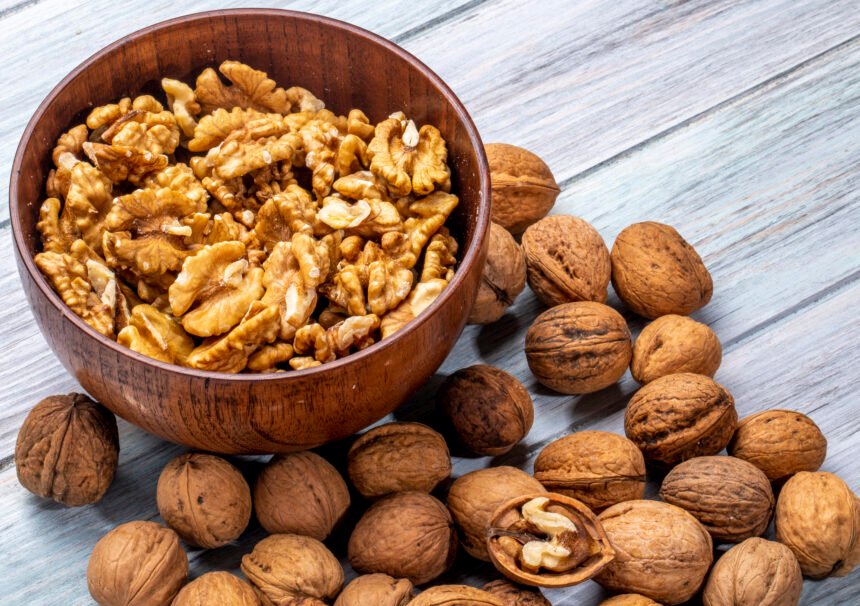Walnuts' nutritional value
A 1-ounce (28g) serving of walnuts (approximately 7 whole walnuts) provides:
- Calories: ~185
- Protein: 4.3g
- Carbohydrates: 3.9g
- Fiber: 2g
- Fat: 18.5g (mainly polyunsaturated fats)
- Omega-3 (ALA): 2.5g
- Vitamin E: 10% Daily Value (DV)
- Magnesium: 11% DV
- Phosphorus: 10% DV
- Copper: 50% DV
- Manganese: 42% DV
Walnuts are one of the finest plant sources of omega-3 fatty acids, vital for heart and brain function.
Benefits of walnuts for the body


Could lessen inflammation
Inflammation, which can be produced by oxidative stress, is the basis of many diseases, including:
- heart conditions
- type 2 diabetes
- Alzheimer’s disease
- cancer
The polyphenols in walnuts can help prevent oxidative stress and inflammation.
It is possible that ellagitannins, a subclass of polyphenols, are particularly active.
Your gut’s beneficial bacteria transform ellagitannins into substances known as urolithins, which may have anti-inflammatory properties.
Can encourage intestinal health
According to studies, you have a better chance of having a healthy gut and general well-being if your stomach is full of bacteria and other microorganisms that promote health.
An unhealthful gut microbiota composition can raise your risk of obesity, heart disease, and cancer by causing inflammation and disease in your gut and other parts of your body. Your microbiota’s composition can be greatly influenced by the foods you eat. Consuming walnuts could be one method to promote gut and microbial health.
Able to assist with weight control
Consuming walnuts could help control your appetite.
Drinking a smoothie packed with roughly 1.75 oz (48 g) of walnuts once daily for five days reduced the participants’ appetite and hunger, according to a well-controlled 2019 study with ten obese individuals. This was contrasted with a placebo beverage that had the same number of calories and nutrients.
Furthermore, following five days of walnut smoothie consumption, brain scans revealed that the participants’ resistance to extremely alluring food cues, such cake and french fries, was strengthened by increased activation in a particular area of the brain.
Potentially beneficial for type 2 diabetes
According to a previous 2017 study, walnuts may help control weight, which may be one factor in their association with a decreased risk of type 2 diabetes.
Being overweight raises your chances of diabetes and high blood sugar. Beyond their impact on weight management, walnuts may also help control blood sugar through other ways.
Additionally, according to some 2021 study, adding walnuts to your diet may result in a slight improvement in blood glucose levels.
Could encourage aging in a healthy way
Maintaining your mobility and independence as you age depends on your physical functioning.
Healthy eating practices are one item that could assist you keep up your physical capabilities.More than 50,000 women over the age of 18 participated in an earlier 2016 study, which revealed that those with the healthiest diets were 13% less likely to experience physical disability.
Among the foods that contributed most to a healthy diet were walnuts. Walnuts are rich in vital vitamins, minerals, fiber, lipids, and plant chemicals that may support healthy physical performance as you age, despite their relatively high calorie content.
Could enhance reproductive health
A 2022 review found that typical Western diets, which are heavy in processed foods, sugar, and refined grains, have been associated with decreased sperm function.
According to the same review, walnut consumption may help protect sperm by lowering oxidative damage in their membranes, according to some animal research.To find out more about these advantages, more research is required. It is easy to try eating walnuts if you are worried about sperm function and fertility.
Different Walnut Types
- The most popular and mildly flavored are English walnuts, often known as Persian walnuts.
- Black walnuts are high in antioxidants and have a robust, earthy flavor.
- White Walnuts (Butternuts): A uncommon cultivar with a sweeter flavor.
Methods for Eating Walnuts
- Consume uncooked as a nutritious snack.
- Add to yogurt, smoothies, or porridge.
- Use in breads, cakes, brownies, and other baked products.
- Toss over salads for a little crunch.
- Use walnut oil as a salad dressing or in cooking.
Precautions
- Eat walnuts sparingly because they are high in calories (4–7 walnuts a day is plenty).
- If in doubt, seek medical advice as some people may be allergic to nuts.
- Bloating or stomach discomfort can result from overeating.
Concluding remarks
More than simply a delicious nut, walnuts are a superfood that promotes heart health, cognitive health, weight loss, and radiant skin. One of the simplest methods to improve long-term health and vigor is to include a handful of walnuts in your daily diet.


